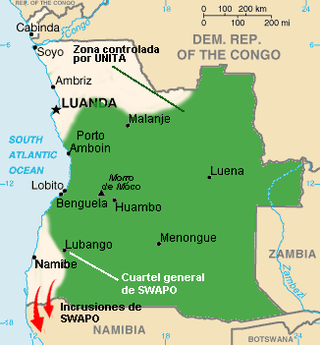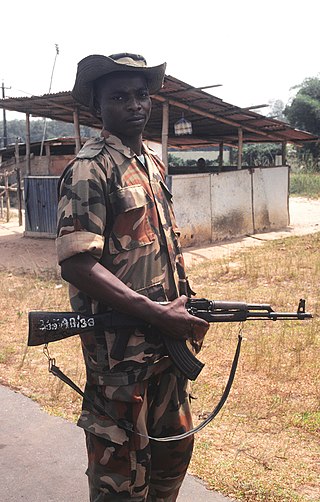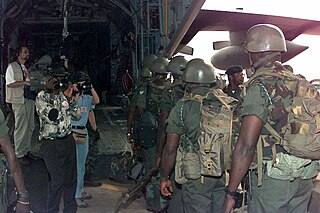
The First Liberian Civil War was the first of two civil wars within the West African nation of Liberia which lasted between 1989 and 1997. President Samuel Doe's regime of totalitarianism and widespread corruption led to calls for withdrawal of the support of the United States, by the late 1980s. The National Patriotic Front of Liberia (NPFL) led by Charles Taylor invaded Liberia from the Ivory Coast to overthrow Doe in December 1989 and gained control over most of the country within a year. Doe was captured and executed by the Independent National Patriotic Front of Liberia (INPFL), a splinter faction of the NPFL led by Prince Johnson, in September 1990. The NPFL and INPFL fought each other for control of the capital city, Monrovia and against the Armed Forces of Liberia and pro-Doe United Liberation Movement of Liberia for Democracy. Peace negotiations and foreign involvement led to a ceasefire in 1995 but fighting continued until a peace agreement between the main factions occurred in August 1996. Taylor was elected President of Liberia following the 1997 Liberian general election and entered office in August of the same year.

The United Nations Mission in Liberia (UNMIL) was a United Nations peacekeeping operation established in September 2003 to monitor a ceasefire agreement in Liberia following the resignation of President Charles Taylor and the conclusion of the Second Liberian Civil War (1999–2003). At its peak it consisted of up to 15,000 UN military personnel and 1,115 police officers, along with civilian political advisors and aid workers.

United Nations Security Council resolution 788, adopted unanimously on 19 November 1992, after determining that the deterioration of the situation in Liberia constituted a threat to international peace and security, the council imposed an arms embargo on the country for the purposes of establishing peace and stability.

United Nations Security Council Resolution 813, adopted unanimously on 26 March 1993, after reaffirming Resolution 788 (1992) and determining that the situation in Liberia constituted a threat to international peace and security, the Council condemned the failure of the parties in the country – the Armed Forces of Liberia, ULIMO, National Patriotic Front of Liberia and Independent National Patriotic Front of Liberia among others, to implement the Yamoussoukro IV Accord.

United Nations Security Council resolution 851, adopted unanimously on 15 July 1993, after reaffirming resolutions 696 (1991), 747 (1992), 785 (1992), 793 (1992), 804 (1993), 811 (1993), 823 (1993) and 834 (1993), the Council noted the continuing deterioration of the situation in Angola and extended the mandate of the United Nations Angola Verification Mission II until 15 September 1993, discussing further the peace process in the country.

United Nations Security Council resolution 856, adopted unanimously on 10 August 1993, after reaffirming Resolution 813 (1993) and welcoming a peace agreement signed, under the auspices of the Economic Community of West African States (ECOWAS), between the Interim Government of National Unity of Liberia (IGNU), the National Patriotic Front of Liberia (NPFL), and the United Liberation Movement for Democracy (ULIMO), the Council approved a dispatch of 30 military observers to Liberia.

United Nations Security Council resolution 866, adopted unanimously on 22 September 1993, after reaffirming resolutions 813 (1993) and 856 (1993), the council noted that United Nations involvement would contribute significantly to the effective implementation of the peace agreement in Liberia and went on to establish the United Nations Observer Mission in Liberia (UNOMIL).

United Nations Security Council resolution 911, adopted unanimously on 21 April 1994, after reaffirming resolutions 813 (1993), 856 (1993) and 866 (1993), the Council welcomed progress made towards establishing the Liberian National Transitional Government but was concerned about subsequent delays in implementing the Cotonou Peace Agreement, and extended the mandate of the United Nations Observer Mission in Liberia (UNOMIL) until 22 October 1994.

United Nations Security Council resolution 972, adopted unanimously on 13 January 1995, after reaffirming resolutions 813 (1993), 856 (1993), 866 (1993), 911 (1994) and 950 (1994), the council discussed the peace process in Liberia and extended the mandate of the United Nations Observer Mission in Liberia (UNOMIL) until 13 April 1995.

United Nations Security Council resolution 985, adopted unanimously on 13 April 1995, after reaffirming resolutions 813 (1993), 856 (1993), 866 (1993), 911 (1994), 950 (1994) and 972 (1995), and 788 (1992) which imposed an arms embargo on Liberia, the council established a committee to monitor the implementation of the embargo and extended the mandate of the United Nations Observer Mission in Liberia (UNOMIL) until 30 June 1995.

United Nations Security Council resolution 1001, adopted unanimously on 30 June 1995, after reaffirming resolutions 813 (1993), 856 (1993), 866 (1993), 911 (1994), 950 (1994) and 972 (1995), and 985 (1995) on Liberia, the Council discussed the implementation of peace agreements in the country and extended the mandate of the United Nations Observer Mission in Liberia (UNOMIL) until 15 September 1995.

United Nations Security Council resolution 1014, adopted unanimously on 15 September 1995, after recalling all resolutions on the situation in Liberia, particularly 1001 (1995), the council discussed various aspects of the civil war and extended the mandate of the United Nations Observer Mission in Liberia (UNOMIL) until 31 January 1996.

United Nations Security Council resolution 1020, adopted unanimously on 10 November 1995, after recalling all resolutions on the situation in Liberia, particularly 1001 (1995), the Council discussed the implementation of the peace process during the First Liberian Civil War and adjusted the mandate of the United Nations Observer Mission in Liberia (UNOMIL) to include other functions.

United Nations Security Council resolution 1041, adopted unanimously on 29 January 1996, after recalling all resolutions on the situation in Liberia, particularly 1020 (1995), the Council extended the mandate of the United Nations Observer Mission in Liberia (UNOMIL) until 31 May 1996 and discussed efforts to restore stability in the country.

United Nations Security Council resolution 1059, adopted unanimously on 31 May 1996, after recalling all resolutions on the situation in Liberia, particularly Resolution 1041 (1996), the Council extended the mandate of the United Nations Observer Mission in Liberia (UNOMIL) until 31 August 1996 and discussed the security situation in the country.

United Nations Security Council resolution 1071, adopted unanimously on 30 August 1996, after recalling all resolutions on the situation in Liberia, particularly Resolution 1059 (1996), the Council extended the mandate of the United Nations Observer Mission in Liberia (UNOMIL) until 30 November 1996 and discussed matters relating to UNOMIL.

United Nations Security Council resolution 1083, adopted unanimously on 27 November 1996, after recalling all resolutions on the situation in Liberia, particularly Resolution 1071 (1996), the Council extended the mandate of the United Nations Observer Mission in Liberia (UNOMIL) until 31 March 1997 and discussed matters relating to UNOMIL.

United Nations Security Council resolution 1100, adopted unanimously on 27 March 1997, after recalling all resolutions on the situation in Liberia, particularly Resolution 1083 (1996), the Council extended the mandate of the United Nations Observer Mission in Liberia (UNOMIL) until 30 June 1997.

United Nations Security Council resolution 1116, adopted unanimously on 27 June 1997, after recalling all resolutions on the situation in Liberia, particularly Resolution 1100 (1997), the Council extended the mandate of the United Nations Observer Mission in Liberia (UNOMIL) until 30 September 1997 with the expectation that it will terminate on that date.

United Nations Security Council resolution 1497, adopted on 1 August 2003, after expressing concern at the situation in Liberia, the Council authorised a multinational force to intervene in the civil war to support the implementation of a ceasefire agreement using "all necessary measures".















